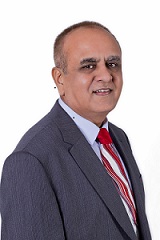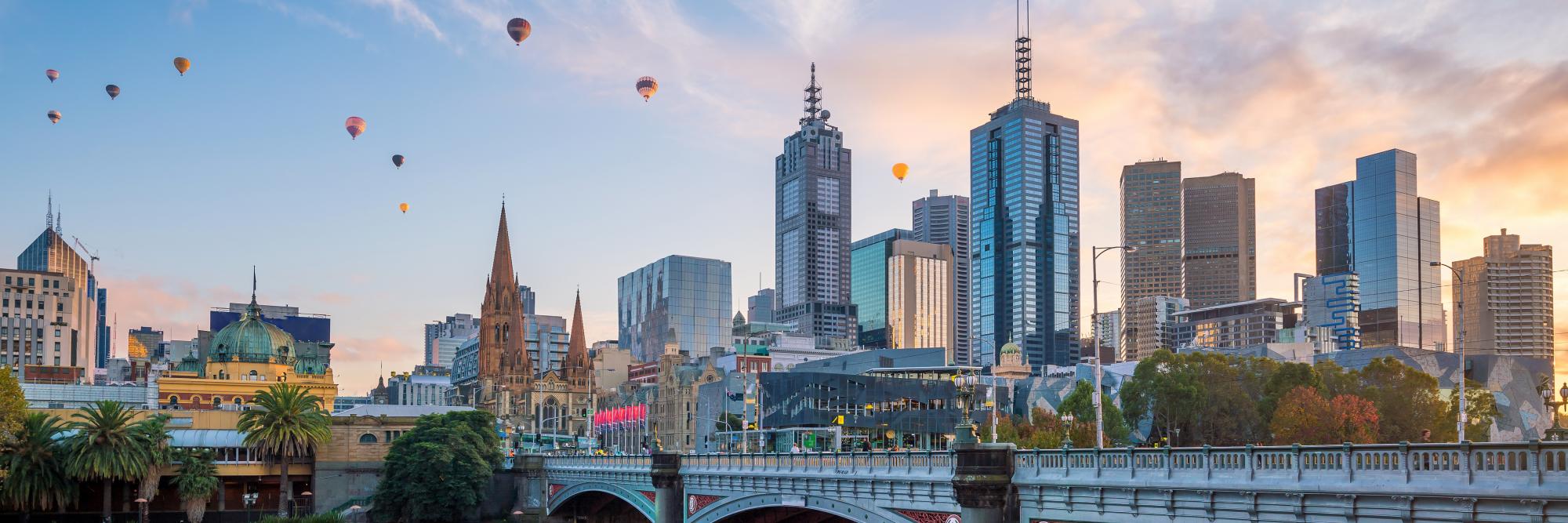Rajiv Bedse is an expat from India who has been living in Melbourne since 1997. Rajiv moved to Australia with his wife and two children as he believed the country provide a better style and education opportunities for his children. After spending 16 years in the corporate sector, Rajiv has now started his own life coaching business which targets expats in overcoming the challenges of moving to a new place.
About Rajiv

Q: Where are you originally from?
A: I am originally from India
Q: Where are you living now?
A: Melbourne, Australia
Q: When did you move to Oz?
A: We moved in May 1997
Q: Did you move to Melbourne alone or with a spouse/family?
A: With my wife and 2 children aged 13 and 15. We migrated here on a PR (permanent residency) visa with no job, and very little money.
Q: Why did you move to Australia; what do you do?
A: I moved to Australia for giving a better tertiary education, lifestyle and facilities to my children. I worked in the corporate sector in Melbourne for about 16 years, and now I am professionally helping expats to overcome challenges that expats typically face after relocation. You can get more information about me and my work at Expat Life Coaching.
Living in Australia
Q: What do you enjoy most about Melbourne? How would you rate the quality of life compared to India?
A: Melbourne is “the most liveable city” in the world and offers world-class living. The quality of life here is unmatched. Human beings are well respected and looked after. People are quite helping and courteous. One more thing I enjoy is Melbourne weather. It is always fluctuating and unpredictable but the weather forecast is always accurate.
Q: Any negatives? What do you miss most about home?
A: I migrated to Australia after spending almost half of my life in India, and missed my relatives and friends back home. But I helped 3 close families to migrate to Australia and now we all live very close to each other in Melbourne.
Q: What are the biggest adjustments you had to make when settling into expat life in Australia? Did you experience any particular elements of culture shock?
A: Culture shock and financial insecurity were the two biggest setbacks my family suffered after coming to Australia. But we all quickly learnt how to adapt to this new culture without compromising on our values and beliefs. Now I coach this to my clients.
Q: What’s the cost of living in Melbourne compared to home? What is cheap or expensive in particular?
A: Cost of living in Melbourne is quite high in comparison with India. But I guess, you have to pay the price for everything in life. On a brighter side it is a motivation to work hard, excel at work, and earn more money. I believe food is quite reasonable in Australia whereas items like wooden furniture, trades-people services, books, and medicines are relatively expensive.
Q: How would you rate the public transport in Melbourne? What are the different options? Do you need to own a car?
A: Public transport in Melbourne is based on zoning system and is quite good. One can travel by bus, tram, or train on a single ticket within a zone. Due to less population thickness in Australia frequency of public transport over the weekend is quite less. Hence ideally, you should have a car in Melbourne. But if you are working in the CBD (downtown) you may not need a car at all. Most people working in the CBD leave their cars at the train station and hop on to the train. This is a much economical way of travelling to the CBD if you don’t need to travel around as a part of your job. Car parking in the CBD is quite expensive and strict parking regulations must be followed in order to avoid fines.
Q: How would you rate the healthcare in Melbourne? Have you had any particularly good/bad experiences with regards to doctors and hospitals? Are there any hospitals you would recommend?
A: Melbourne offers incredible healthcare system. All GP’s have to continuously upgrade their knowledge and make sure they are in sync with currently available systems and medicines. Allegations against doctors are taken quite seriously and human life is given high importance. The public hospitals are well equipped and very well managed. My father received the best treatment in a public hospital when he was suffering from cancer. I believe the level of care he received in the public hospital was much higher in a private hospital in India. Similarly, my sister in law’s life was saved due to world class medical facilities in another public hospital when she suffered from Swine Flu. I believe all public hospitals are equally good but if I have to name a few they might be Royal Alfred Hospital, and Austin Hospital in Melbourne.
Q: What are the biggest safety issues facing expats living in Melbourne? Are there any areas expats should avoid?
A: Melbourne is a very safe place to live. But like any other city there is vandalism in certain suburbs like Footscray, Sunshine, Springvale, Broadmeadows, Falkner etc. which should be avoided.
Q: How do you rate the standard of housing in Melbourne? What different options are available for expats?
A: Housing standard in Melbourne is very high. Expats prefer living in the close by vicinity of main city for obvious reasons. There are shared and non-shared apartments available near city. Many expats share accommodation with other expats till they look for a permanent accommodation.
Q: Any areas/suburbs of Melbourne you’d recommend for expats to live in?
A: Rental apartments are available in areas like Toorak, South Yarra, Carnegie, Malvern, Essendon, Niddrie etc. which are not too far away from the main city.
Meeting people and making friends
Q: How tolerant are the locals of foreigners? Is there any obvious discrimination against particular religions or women etc.?
A: With my experience of living in Melbourne for over 16 years I believe locals are very friendly with foreigners. Melbourne is a very multicultural city. As a result locals have great multicultural awareness. I don’t believe there is any obvious discrimination against a particular religion or women. There have been a few cases of attacks on Indian students in Melbourne in the past but I don’t believe they were due to discrimination.
Q: Was it easy meeting people and making friends in Melbourne? How did you go about meeting new people?
A: Meeting people and making new friends has been extremely easy. Locals are extremely receptive, welcoming, and compassionate towards immigrants and expats. I made many friends in this city by taking the initiative to say “hi” and shake hands with them.
Q: Have you made friends with locals or do you mix mainly with other expats? What advice would you give to new expats looking to make friends in Melbourne? Any social/expat groups you can recommend?
A: I prefer to have friends from all nationalities. The suburb where I live in Melbourne is extremely multicultural. I have made equal if not more friends from locals than I have with expats. The one piece of advice I would give to expats is, you take the first step of introducing yourself to others than expecting others to come to you. The more humble you are, the more friends you will make. There are quite a few social groups such as various community associations, networking groups, Meetups and many more.
About working here
Q: Did you have a problem getting a visa or work permit in Australia? Did you tackle the visa process yourself or did you enlist the services of an immigration consultant?
A: I handled the visa process myself. The problem I faced back then was that I had to wait for 2 ½ years to get my visa. Now the situation might have changed. Australian Govt. is very strict about who they issue permanent migration visas to.
Q: What’s the economic climate like in Australia? Do you have any tips for expats looking to find a job there? Which resources did you find most useful?
A: I believe the country’s economy in general is quite healthy with an unemployment rate of just under 6%. This means immigrants will certainly find a job after coming to Melbourne. They may not get a job in their own profession but they surely will get a job which will make them a living. Employers give a lot of importance to local experience; hence it can take a while before immigrants get a job in their usual profession. Expats relocating to Australia on deputation do not have to face this challenge.
Q: How does the work culture differ from home? Do you have any tips for expats doing business in Australia?
A: Manners and etiquettes are as important in Australia as ethics. Efficiency levels of employees are quite high and honesty is the best policy in Australia. People at work are very professional and work hard. Most jobs being result-driven employees are required to work with sincerity and produce results in order to keep their job.
Many people prefer having their own business instead of working for someone. Australia is a great place to do ethical business.
Family and children
Q: Did your spouse or partner have problems adjusting to their new home in Melbourne? Do you think there are any specific challenges for a trailing spouse?
A: Most definitely. Cultural shock, financial insecurity, looking after 2 teenaged children who were never exposed to a Western culture were a few challenges my wife faced.
Q: Did your children settle in easily? What were the biggest challenges for your children during the move?
A: Initially it was very hard for my teen-aged children to settle. New friends, different education system.
Q: What are the schools like in Melbourne, any particular suggestions?
A: Tertiary education system in Australia is of a high standard but I think school education in India is of a much high standard than in Australia. I believe parents’ involvement in their children’s education, family bonding, and children’s upbringing plays in important role in children’s development.
And finally…
Q: Is there any other advice you would like to offer new expat arrivals in Melbourne?
A: Australia truly is a “land of opportunities” but only for those who are committed, hard working and persistent. Expats might have a price to pay or are required to sacrifice certain things but if your “why” is clear to you sky is the limit to what you can achieve in this great country. If someone like me who migrated to Australia at 42 with two teen-aged children and highly educated wife, no job and hardly any money can survive, excel, and settle in Australia, anyone can. And by the way, migration to Australia was my family’s first aeroplane journey.
– Interviewed May 2014



